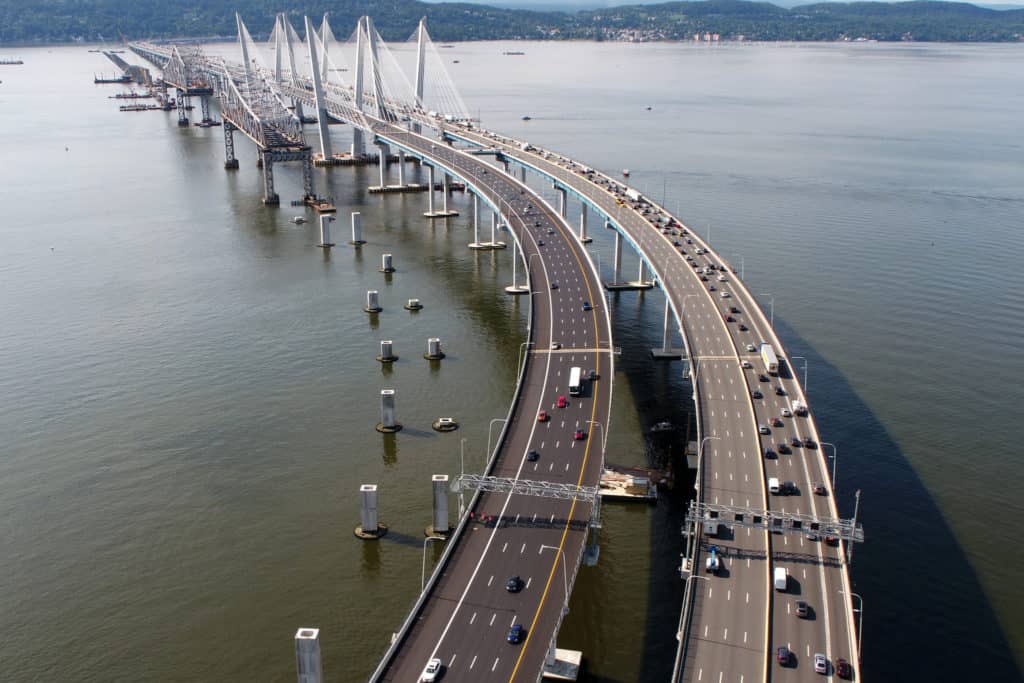
By Dan Murphy
For more than two years, this reporter and others in the media have been trying to find the answer to the question: What will the new toll on the Tappan Zee-Mario Cuomo Bridge be? Certainly the toll has to be more than the current $5 cash, and $4.75 with E-Z Pass toll across the new span. The toll remains frozen until 2020, which is now less than a year away.
I don’t use the new bridge any more than I used the old bridge – less than a dozen times a year, either traveling to the Jersey shore or to relatives for the holidays, or the Palisade Mall. But for those commuters from Rockland, or those reverse-commuting to Rockland or to New Jersey from Westchester, the new toll is a serious financial matter.
A recent public hearing on the new toll was held by the New York State Thruway Authority, who is the operator of the bridge and borrowed much of the bridge’s $4 billion construction cost. “No one should have to become a working poor person just to cross the bridge,” said Hiram Rivera
At some point the Thruway Authority must start to pay off the bonds used to pay for the $4 billion bridge, including a federal low-interest loan of $1.6 billion.
For two years, members of the NYS Thruway Authority have been unable to disclose how much the new toll will be, and when the new toll will begin. That silence has led to speculation on what the toll will be, some guessing it could be as high as $15 cash and $12.50 for EZ Pass holders.
Elected officials from Westchester are starting to sound the alarm against a high toll.
“A toll increase on the new bridge would be unfairly forcing Rockland and Westchester residents who already pay high taxes to also pay more for the bridge,” said State Sen. David Carlucci, who represents Ossining and Rockland County.
Carlucci also commented to the NYS Thruway Authority Board at the hearing that an estimated $739 million in revenue from the Thruway Authority should be used to keep the new TZ-Cuomo bridge toll low.
Westchester Assemblyman David Buchwald said the bridge is the linchpin of the regional transportation network in the lower Hudson Valley.
“Full transparency is essential,” he said. “If the bridge toll is to be increased, the public deserves to know exactly how that relates to paying for the costs of the new bridge. I do not think it is appropriate to meaningfully raise tolls without everyone understanding the long-term financial situation, including the extent to which a toll increase would pay for the bridge and Rockland/Westchester Thruway improvements, or if it would subsidize other Thruway operations.
“I urge the toll advisory panel to establish commuter discounts for Rockland and Westchester residents,” continued Buchwald. “Furthermore, working with the Metropolitan Transportation Authority’s Traffic Mobility Review Board developing congestion pricing tolls for the central business district of Manhattan, I request that this bridge toll panel see if there is any way to develop a reduced-combination toll for commuters who then travel into Manhattan. I know that such an idea requires coordination between two separate authorities, but ultimately it is the pocketbook impact on New Yorkers that must be considered.”
Rockland County Executive Ed Day added: “With the looming congestion pricing for Manhattan, Rocklanders will be doubly impacted by tolls unless deep discounts or exemptions are provided in both cases. The cost for the new bridge must be shared by all, just as the revenue the old bridge generated for decades went to support the entire Thruway system.”
One way to keep tolls lower for commuters on the bridge is to make tolls higher for trucks, which have been taking the new bridge at higher levels. One reason for increased trucks on the bridge is that it is much cheaper than the George Washington Bridge, which charges $100 for trucks, compared to $33 on the Cuomo span.
Truck traffic on the bridge has more than doubled over seven years, from 1 million trucks in 2010 on the TZ bridge, to 2.4 million on the TZ-Cuomo bridge in 2017. During the same time, GW truck traffic decreased by 20 percent.
Congestion pricing could be another option for the TZ-Cuomo Bridge, or giving drivers and truckers a cheaper rate if they travel during off-peak hours. Trucks are currently given a discount if they travel from midnight to 6 a.m.
The one positive to a large increase of truck traffic on the TZ-Cuomo Bridge is that revenue for truck tolls has almost doubled over the same seven-year time frame, from $25 million to $48 million.
Gov. Andrew Cuomo, who has led the process and discussion over what the new toll will be for the bridge named after his father, has created a toll panel to listen to the community and come up with a reasonable increase.
Board members Mario Cilento, Heather Briccetti, Joan McDonald and Robert Megna now have the unenviable responsibility of coming up with a dollar amount. Discounts for residents of Westchester and Rockland, and for commuters, are two other possibilities.
“We will continue to keep tolls as low as possible on the bridge for all motorists while providing the resources necessary to support the user-fee supported system,” said Matthew Driscoll, executive director of the NYS Thruway.
County Executive George Latimer said at the hearing: “The final assessment for the Mario Cuomo Bridge shouldn’t be the toll. We have to keep in mind the people who will travel this bridge. As moderate a toll as can be constructed would be helpful to the men and women of this county.”
And what are the current tolls for the other Hudson River crossings? The GW Bridge now costs $10.50 off-peak/ $12.50 peak with an EZ Pass, and $15 cash. The Bear Mountain Bridge toll is $1.25 with an EZ Pass and $1.50 cash – by far the best deal on the Hudson River.





